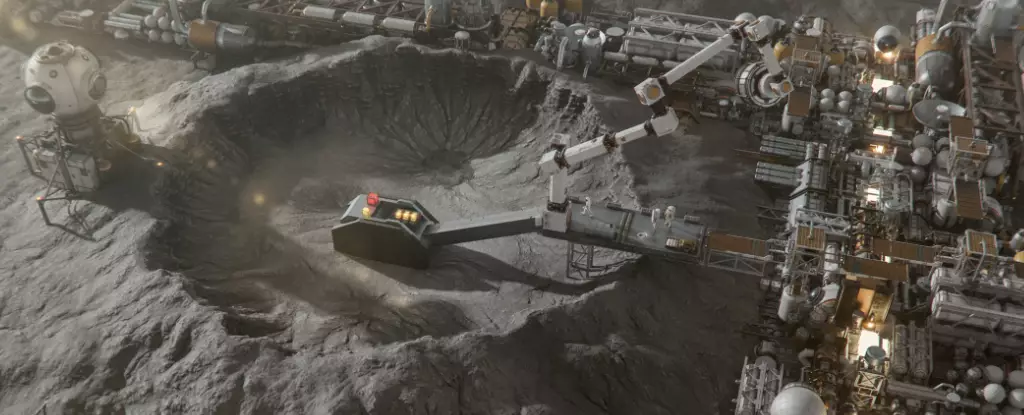As we navigate through the 21st century, the prospect of mining lunar resources is transforming from a fanciful dream into a tangible reality. With countries like the United States and China ramping up their space exploration initiatives, a new form of competition is emerging—one that revolves around the lucrative resources of the Moon. NASA’s ambitious Artemis program not only aims to return astronauts to the lunar surface but also sets the stage for commercial mining endeavors that could reshape our understanding of economics and resource availability in space. However, this burgeoning interest in lunar mining invites urgent discussions about the ethical, legal, and environmental implications of such activities.
At the heart of this lunar race lies a multitude of economic incentives. Currently, every drop of water or ounce of fuel transported to the Moon comes at an astronomical cost; estimates suggest that a single liter of water can be more valuable than gold by the time it reaches lunar orbit. The extraction of water ice from the Moon’s surface has the potential to transform that equation. By converting this ice into hydrogen and oxygen, space agencies and private contractors could refuel spacecraft on-site, vastly reducing the cost of deep-space missions, particularly those aimed at Mars and beyond.
Moreover, the Moon is thought to harbor rich deposits of rare Earth metals, critical for the manufacturing of modern technology, from smartphones to electric vehicles. As Earth’s reserves dwindle, the allure of these lunar resources grows ever stronger. However, this economic windfall may come with significant risks if not managed responsibly; unchecked extraction could result in ecological damage and cultural loss on a celestial body that has historically been viewed as a symbol of human aspiration.
The complexities of international space law complicate the prospect of lunar mining. The Outer Space Treaty of 1967 stipulates that no nation can claim sovereign ownership over celestial bodies, yet ambiguity remains about whether commercial extraction activities conflict with this non-appropriation principle. The subsequent Moon Treaty of 1979 categorizes the Moon’s natural resources as the “common heritage of mankind,” implying a collective benefit for all nations. In contrast, the 2020 Artemis Accords appear to provide a more lenient framework that allows for mining while still asserting that no sovereign claims can be made over the Moon itself.
This legal inconsistency raises crucial questions: If a private company extracts resources from the Moon, who truly benefits from such activities? Do developed nations owe any responsibility to the rest of the world to share the financial gains derived from lunar resources? The existing frameworks may be inadequate to protect global interests, particularly those of less affluent countries that may lack the means to participate in lunar mining ventures.
Beyond legal hurdles and economic motivations, the human element of lunar mining raises ethical concerns that cannot be overlooked. The psychological and physical toll on miners should not be underestimated, as they will operate in a low-gravity environment rife with challenges, from exposure to cosmic radiation to the isolating nature of space work. The stress of prolonged missions could exacerbate mental health issues, while lack of proper health and safety regulations may leave workers vulnerable to exploitation.
Charles S. Cockell, a British astrobiologist, warns of this dystopian scenario where the potential for “space tyranny” looms large. With regulatory bodies situated thousands of kilometers away, marginalized workers may find themselves at the mercy of employers with little regard for fair labor practices. If we are to move forward into this new frontier, it is essential that we establish stringent labor rights and safety standards that prioritize the well-being of all workers involved in lunar mining.
The Moon stands as a beacon of hope for humankind, a timeless symbol of exploration that could inspire future generations. However, the journey towards lunar mining must be navigated with caution and foresight. As nations and corporations eye the Moon’s resources, they must commit to forming comprehensive regulations that prioritize environmental sustainability, equitable distribution of resources, and the rights of workers. In doing so, we can unlock the Moon’s potential while ensuring that it remains a source of inspiration rather than a battleground for exploitation. Only by prioritizing ethical considerations can we hope to maintain the Moon’s nobility as we step into this uncharted territory of human endeavor.


Leave a Reply